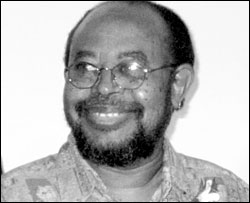I KNEW TYREE SCOTT, but this, in itself, was not remarkable. Over a civic history that touched five decades, almost every progressive political activist in Seattle knew Tyree Scott. Scott’s name, however, isn’t familiar to most Seattleites. He never held elected officenever, even, was one of those activists who ran for the cameras whenever a controversy arose. He was significant enough that his death made the front page of the Local section of The Seattle Times, and unfamiliar enough that the photo they used of him looked like it was at least 30 years old.
Tyree was 63 when he died on June 19 after a long battle with prostate cancer. But even as he fought the disease, you’d see him at panels and conferences and public events, holding forth with his usual eloquence on one or another topic. Most of his audiences were invariably young, and most of them had, I suspect, little idea of his remarkable history.
SCOTT BURST into Seattle’s consciousness in the late 1960s, as a 29-year-old electrician trying to help his father build his Central District business. At that point, the trade unions that controlled jobs in Seattle’s construction industry were pointedly off-limits to blacks. Scott’s introduction to politics was to lead a group of black workers and activists that eventually broke through the racial barriers in those unions.
In doing so, Tyree set the tone for the rest of his life, as an activist more interested in results than rhetoric. His late-1960s focus on jobs and ways out of poverty for working-class blacks, at a time when Black Power was at its height and “revolution” wasn’t just a cliché, alienated him from some other black activists as thoroughly as he was despised by Seattle’s old-guard labor bosses. But he won, and a lot of nonwhites in Seattle have had more prosperous careers as a result.
THE STORY, HOWEVER, does not stop there. His lack of fiery rhetoric notwithstanding, Tyree was a radical, in the sense of honing in on the root of a matter. He stayed that way, adding new chapters to his activist legacy even as his ’60s peers drifted away to other concerns. By 1972, he was helping to co-found the Northwest Labor and Employment Law Office (LELO), an organization that continues to be at the forefront of a variety of civil-rights and workplace issues.
LELO, in turn, was the organization that took on the exploitation of Filipinos not only in Seattle, but under the U.S.-backed dictatorship of Ferdinand Marcos. The other two co-founders of LELO, Silme Domingo and Gene Viernes, were assassinated here by Marcos’ secret police in 1981. The resulting international uproar and solidarity campaign was one of the sparks that eventually led to the 1986 “People Power” revolution in Manila that ousted Marcos.
MEANWHILE, SCOTT TOOK on other interests. Through LELO and various aid organizations, he increasingly linked the woes of American workers, especially nonwhites, with the exploitation of “third world” workers, long before globalization entered anyone’s vocabulary. He forged international labor ties and worked, both here and there, to bring material aid to Mozambique and southern Africa. His emphasis was on the pragmatic.
When, in 1999, the World Trade Organization (WTO) came to town, Scott was one of the elders who, long before the TV cameras showed up, was helping in the yearlong effort to educate activists and Seattle-area residents on why arcane institutions like the WTO and International Monetary Fund matterednot just to distant people, but to workers right here. He was eloquent, he was knowledgeable, and he’d seen it all. And another new generation of activists listened and learned.
For progressive activists, that doesn’t happen too often. Our culture does a poor job of remembering history, even local history, that doesn’t involve elected officials or generals. Progressive activists, usually young, are forever reinventing wheels in their struggles against injustice. And the elders who could provide help are often nowhere to be found, long gone to jobs, families, the vagaries of life.
BECAUSE TYREE SCOTT never held office, or played for the Huskies, or helped lead Boeing, his passing went largely unnoticed locally. The Times story on his passing, not surprisingly, emphasized his ’60s activism; those were the campaigns that represented a local landmark. And “’60s activist” is a convenient stereotype for an unfamiliar public.
But Scott represented far more. He meant a lot to many people who weren’t in Seattle 35 years ago, and many who weren’t even born then. He was cherished not for any particular campaign or issue, but for all of them; he was valuable not just for his hard-earned wisdom, but for his example.
It’s a pity we don’t name city parks, even the smallest ones, for our fallen heroes on the basis of how many people they inspired. In Tyree’s case, we should.







